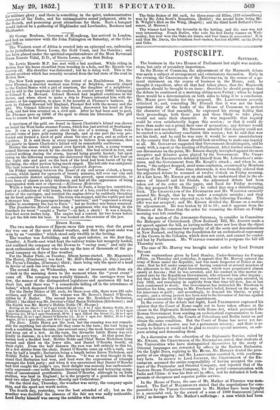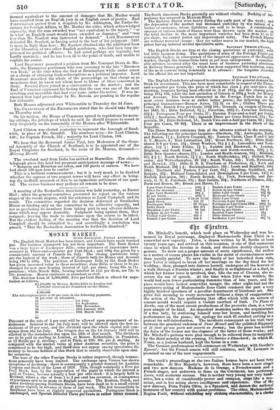POSTSCRIPT.
SATURDAY..
The business in the two Houses of Parliament last night was multifa- rious, but only of secondary importance. In the House of Commons, the adjournment of the Maynooth debate was again a subject of arrangement and criminabary discussion. Early in the evening, the CHANCELLOR of the EXCHEQUER, in the course of a ge- neral statement on the course of business in the House, said, he thought it expedient, after all that had taken place, that the Maynooth question should be brought to an issue ; therefore he should propose that the debate be continued at a morning sitting next Friday ; when he hoped there would be a determination on both sides to bring it to a conclusion. Mr. MILER gave thanks for this proposal. Mr. LABOUCHRRE severely criticized it; and, reminding Mr. Disraeli that it was not the least important duty of the leader of the House of Commons to protect the character of that assembly, he expressed his strong feeling that their proceedings, both those past and those likely to take place, would not raise their character. It was impossible that inquiry could be even satisfactorily begun this session ; or that it could do more than make out a prima facie case of accusation ; any defence would be a farce and mockery. Mr. S000NER admitted that inquiry could not be carried to a satisfactory conclusion this session ; but he said that was not his fault, and he said he was sure it would be more unsatisfactory to the country that the House should look unwilling to make any inquiry at all. Mr. GOULBUBN suggested that Government should inquire, and be ready with a report at the meeting of Parliament. After further miscellane- ous discussions on the point, Mr. KEOGH sharply inveighed against the most deceptive and delusive game played by the Government. The Caere- cituoit of the EXCHEQUER defended himself from Mr. Labouchere's stric- tures, and the Government from Mr. Keogh's attack ; and when he sat down, "the subject dropped, amid some confusion, occasioned by Members leaving the House." Some time afterwards, it was formally ordered that the adjourned debate be resumed at twelve o'clock on Friday morning. At a late hour, Mr. KEOGH got up and said, he understood that in the ab- sence of himself and his friends, the adjourned debate had been taken out of its order on the paper, and fixed for Friday morning, [the day proposed by Mr. Disraeli] : he called that step a thimblerigging trick. The CHANCELLOR of the EXCHEQUER and Ur. IVer.00lar earnestly assured Mr. Keogh, that he was under a complete mistake ; and they proposed, if Friday were objected to, to take the following Tuesday. The offer was not accepted ; and Mr. KEOGH divided the House on a motion for adjournment. He was beaten by 42 to 10; and it appears from the Minutes of the House that the order for resuming the debate on Friday morning was left standing.
On the motion of the ATTORNEY-GENERAL, to consider in Committee the Bishopric of Christchurch (New Zealand) Bill, Mr. Al.:max made a set speech against the bill, as having neither more nor less than the object of destroying the common-law equality of all the sects and denominations in New Zealand, and laying the foundation for an ecclesiastical supremacy of the Crown in the Colonies, which does not exist, and cannot be confer- red but by Parliament. Mr. WeLpor.E consented to postpone the bill till Thursday next.
The case of Mr. Murray was brought under notice by Lord Dunr.HY STUART.
From explanations given by Lord Stanley, Under-Secretary for Foreign Affairs, on Thursday and_yesterday, it appears that Mr. Murray entered the army of Rome under the Republic, and was made Inspector of Police at An- cona; that he fell under suspicion of having connived at several murders of the adherents to the old Papal Government, which were perpetrated almost openly at Ancona; that he was arrested, and his conduct in this matter in- quired into by the Republican Government, who released him after inquiry; but that when the Papal Government was restored he was again arrested, in July 1849, and remaining in captivity from that time till now, has at last been condemned to death. Our Government has instructed Mr. Freeborn to interfere for him, according to Mr. Freeborn's belief, formed on the spot, of his innocence or guilt ; and accordingly, to demand his liberty, or pray a respite; and a strong protest has been sent to the Governor of Ancona against any sudden execution of the capital punishment. In the course of the debate last night, Lord PsiarriteroN expressed his opinion that the Court of Rome ought not to have taken offence at the clause in the Diplomatic Relations with Rome Act, which prevented the Roman Government from sending an ecclesiastical representative to Lon- don, since, practically, the Courts of Petersburg and Berlin insist on and obtain the same condition. But the Court of Rome has never yet for- mally declined to receive any but a permanent mission ; and there is no reason to believe it would not be glad to receive special missions, on sub- jects arising and demanding them.
In a discussion on the education of the Diplomatic Service, raised by Mr. EWART, the CHANcELLoa of the EXCHEQUER stated, that students at the Universities who have distinguished themselves by the study. of Oriental languages are rewarded by offices in the Eastern Embassies. On the Light Dues, replying to Mr. ifinsE, Mr. HENLEY denied the pros- perity of our shipping ; and Mr. LABOUCHERE asserted it, with confirma- tory facts. In answer to Lord JOCELYN, the CH.ANcEuka of the Ex- CHEQUER assumed the entire responsibility of having accepted the con- tract of the Peninsular and Oriental Company, and rejected that of the Eastern Steam Navigation Company, for the postal communication with India and China : it was his first act in office, and he defended it both on grounds of cheapness and superior public service.
In the House of Peers, the case of Mr. Mather at Florence was men- tioned. The Earl of MennrsouRar stated that the negotiations for com- pensation by the Tuscan Government to Mr. Masher have been brought to a successful end, by the award of a sum of 1000 frane,esconi [about 240L) as damages for Mr. Mather's sufferings : a sum which had been
deemed equivalent to the amount of damages that Mr. Mather would have received from an English jury in an English court of justice. Earl FirzwieLLem quoted from a despatch by Mr. Addington, the Under-Se- cretary for Foreign Affairs, to Mr. Mather the elder, which acknowledged expressly, that the sum awarded was "not equivalent to the injury," "or to what an English court would have awarded as damages," and "was less than Mr. Beetled was instructed to demand." Lord Meemmentrar defended Mr. Scarfed, as having acted to the best of his judgment : 240/. is more in Italy than here ; Mr. Searled obtained also the additional boon of the liberation of two other English gentlemen, who had been long mi- prisoned for political offences : he had acted perhaps not logically, but hardly unwisely; and he has been ill to the point of death, and unable to explain his course.
Lord BEAUMONT presented a petition from Mr. Constant Derra de Me- rode, the Hungarian gentleman who was secretary to the late "Baroness
von Beck," at the time when she died at Birmingham while under arrest on a charge of obtaining book-subscriptions as a political impostor. Lord Beaumont described the whole of the proceedings on that charge as so monstrous that he knew not whom most to blame of those concerned in them. Several Peers joined in a conversation on the matter; and the Earl of Ceitiesi.e expressed his feeling that the case was one of the most revolting and incredible that had ever come under his notice. It was in- timated that legal proceedings by Mr. Meroda are pending in the regular law tribunals.
Both Houses adjourned over Whitsuntide to Thursday the 3d June. The CHANCELLOR of the EXCHEQUER stated that he should take Supply on Thursday next.
On his motion, the House of Commons agreed to regulations for =On- ing sittings, the privilege of which he said he should propose to resort to very frequently on the reassembly of the Houses after Whitsuntide.



























 Previous page
Previous page